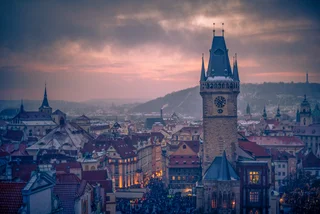Prague City Hall will be banning the two most popular horse-drawn carriage stands in the city center, joining other cities that have responded to complaints about the working conditions for the animals. Rules will also change for selling tickets to bus and boat tours and for defining what is sold at street markets. The moves fit in with Prague’s long-term goal of improving the quality of tourism.
The stands for horse-drawn carriages on the Old Town Square and in Stromovka park will be abolished as of Jan. 1, 2023. City councilors amended the market regulations concerning the carriages in response to a citizens' initiative and a related petition drawing attention to the unsuitable conditions that horses have to face in the city. Prague joins cities such as Paris, London, Oxford, Barcelona, Rome, Montreal, and Chicago, which have banned or restricted horse-drawn carriages on their territory.
PARTNER ARTICLE
“I am glad that Prague was inspired abroad and, following the example of other cities, decided to abolish these stands,” City Councilor Adam Zábranský said.
“This is not a total ban on horse-drawn carriages in the city, but the abolition of two stations in public spaces. We are thus responding to the gradual change in the attitude of Czech society towards animal protection. After the ban on fur farms, caged hens, and the gradual end of training of wild animals in circuses, I see this as another logical step,” Zábranský said.
Jiří Pospíšil, chairman of TOP 09 in Prague, is of the opinion that the use of animals for unnecessary human whim should no longer be tolerated in the 21st century. “That is why last year, even in response to the Horse Not a Machine campaign, I brought a proposal to the Prague City Council to limit horse-drawn carriages in the center of Prague,” he said.
The multi-year Horse is Not a Machine campaign by the association Hlas zvířat (Voice of Animals) included a petition with almost 12,000 signatures. It pointed out that horses are exposed to air pollution, unsuitable temperature conditions, and road surfaces that are not suitable for them.
“This tourist attraction, which is operated at the expense of animal health and satisfaction, has nothing to do with Prague! And I'm glad that the City Council finally came to the same opinion,” Pospíšil said.
“I know very well that this is not the biggest problem associated with animals, but even this small step has a strong symbolism and shows that we are not indifferent to the living conditions of animals and we care about them,” he added.
City Councilor Jan Chabr explained that the deadline of Jan. 1, 2023, is intended to ensure the possibility of discussions with carriage operators and the possible finding of a new home for the animals.
More changes will also gradually come into effect next year. The City Council updated the rules for markets with new definitions to clearly identify what each market is about and what can be sold on them, so people have a better idea what to expect. Definitions include markets for farm goods, food, flowers, mixed, flea (used goods and antiques), Christmas, Easter, or All Saints' Day. The amendment specifies that products from smaller domestic producers are primarily sold at farmers markets.
Earlier this year, Christmas markets were banned due to the pandemic, but some operated simply by changing the name. One market at Wenceslas Square called itself a cultural market but sold primarily Christmas goods.
“At the same time, we will appeal more to minimizing the use of disposable plastic utensils or cups, given the [city’s] climate commitment. Market places should now use plastic products as little as possible and prefer returnable or reusable cups,” Chabr said.
Another major change concerns the sale of tickets for boat and bus sightseeing tours. In simple terms, tickets will only be able to be sold at the place to which they relate, for ships only, for example, directly at the port or berth of a particular ship. In the past, tickets were sold this way a few kilometers from these places. The change does not apply to online sales or sales in stone establishments.
The city previously has improved the city center by reducing visual smog through regulating signs on buildings and banning advertising rickshaws and other gimmicks. People who beg in large costumes such as pandas or superheroes, people who stage shows by blowing bubbles, and other similar attractions have also been banned. Street musicians now also face strict regulations. Other attractions such as beer bikes, Segway tours, and faux historical car tours have also been banned or restricted.












 Reading time: 3 minutes
Reading time: 3 minutes 


























